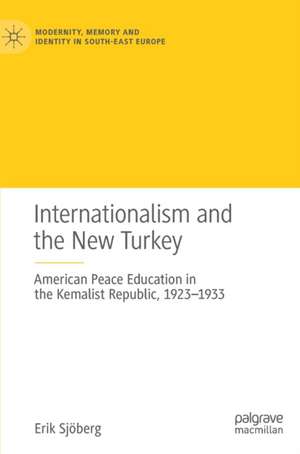Internationalism and the New Turkey: American Peace Education in the Kemalist Republic, 1923-1933: Modernity, Memory and Identity in South-East Europe
Autor Erik Sjöbergen Limba Engleză Hardback – 7 iul 2022
| Toate formatele și edițiile | Preț | Express |
|---|---|---|
| Paperback (1) | 580.82 lei 6-8 săpt. | |
| Springer International Publishing – 7 iul 2023 | 580.82 lei 6-8 săpt. | |
| Hardback (1) | 523.82 lei 3-5 săpt. | +21.91 lei 4-10 zile |
| Springer International Publishing – 7 iul 2022 | 523.82 lei 3-5 săpt. | +21.91 lei 4-10 zile |
Din seria Modernity, Memory and Identity in South-East Europe
- 15%
 Preț: 702.05 lei
Preț: 702.05 lei - 15%
 Preț: 471.69 lei
Preț: 471.69 lei - 15%
 Preț: 502.54 lei
Preț: 502.54 lei - 15%
 Preț: 584.26 lei
Preț: 584.26 lei -
 Preț: 380.84 lei
Preț: 380.84 lei - 18%
 Preț: 780.37 lei
Preț: 780.37 lei - 18%
 Preț: 786.36 lei
Preț: 786.36 lei -
 Preț: 386.81 lei
Preț: 386.81 lei - 15%
 Preț: 499.59 lei
Preț: 499.59 lei - 18%
 Preț: 892.11 lei
Preț: 892.11 lei - 15%
 Preț: 581.14 lei
Preț: 581.14 lei - 18%
 Preț: 887.68 lei
Preț: 887.68 lei - 18%
 Preț: 780.82 lei
Preț: 780.82 lei - 15%
 Preț: 643.16 lei
Preț: 643.16 lei - 15%
 Preț: 698.80 lei
Preț: 698.80 lei
Preț: 523.82 lei
Preț vechi: 631.11 lei
-17% Nou
Puncte Express: 786
Preț estimativ în valută:
100.25€ • 104.27$ • 82.76£
100.25€ • 104.27$ • 82.76£
Carte disponibilă
Livrare economică 25 martie-08 aprilie
Livrare express 08-14 martie pentru 31.90 lei
Preluare comenzi: 021 569.72.76
Specificații
ISBN-13: 9783031009310
ISBN-10: 3031009312
Pagini: 264
Ilustrații: X, 264 p. 10 illus.
Dimensiuni: 148 x 210 x 25 mm
Greutate: 0.48 kg
Ediția:1st ed. 2022
Editura: Springer International Publishing
Colecția Palgrave Macmillan
Seria Modernity, Memory and Identity in South-East Europe
Locul publicării:Cham, Switzerland
ISBN-10: 3031009312
Pagini: 264
Ilustrații: X, 264 p. 10 illus.
Dimensiuni: 148 x 210 x 25 mm
Greutate: 0.48 kg
Ediția:1st ed. 2022
Editura: Springer International Publishing
Colecția Palgrave Macmillan
Seria Modernity, Memory and Identity in South-East Europe
Locul publicării:Cham, Switzerland
Cuprins
1. Introduction: Internationalism and the New Turkey.- 2. Background: Robert College and Late Ottoman Society.- 3. Years of Transition: Adapting to the Republican Order, 1923-1927.- 4. “A moderate and true nationalism”: The Philosophy and Practice of Internationalism and Peace Education at Robert College, c.1927-1933.- 5. Wonderful Changes, Broken Unity: Modernity, Ottoman Past and National Belonging in the Essays of Robert College Students.- 6. Internationalism Defeated: The Downfall of Edgar Fisher.- Chapter 7. Epilogue and Conclusion.
Notă biografică
Erik Sjöberg is Associate Professor of History at Södertörn University, Sweden.
Textul de pe ultima copertă
“Based on recently declassified sources, this excellent monograph addresses the little-researched field of international education in Interwar Turkey. Its careful analysis of changes and personal dramas at the legendary Robert College in Istanbul offers striking new insights that include Western appeasement of Ankara. Ultranationalism in education and history teaching culminated in Turkey’s unopposed ‘History Thesis’, involving a poignant “fall of international education” in the 1930s.”
—Hans-Lukas Kieser is Associate Professor of History at The University of Newcastle, Australia
“By using new archival material, Sjöberg has written a fascinating account of the Robert College in Istanbul in the crucial years of the transition from the Ottoman Empire to the Turkish Republic. In addition to presenting a highly original history of this premier institution, Sjöberg also explains how the idealist hopes for liberal education were crushed in Turkey inthe 1920s and 1930s.”
—Reşat Kasaba, Henry M. Jackson, School of International Studies, University of Washington, USA
—Hans-Lukas Kieser is Associate Professor of History at The University of Newcastle, Australia
“By using new archival material, Sjöberg has written a fascinating account of the Robert College in Istanbul in the crucial years of the transition from the Ottoman Empire to the Turkish Republic. In addition to presenting a highly original history of this premier institution, Sjöberg also explains how the idealist hopes for liberal education were crushed in Turkey inthe 1920s and 1930s.”
—Reşat Kasaba, Henry M. Jackson, School of International Studies, University of Washington, USA
This book examines international education in Turkey after World War I. In this period, a movement for peace and international education among American educators emerged. This effort, however, had to be reconciled with the nationalist projects of new nation-states emerging from the war. In the case of the Near East that meant coming to terms with the radically nationalist modernization project of Kemal Atatürk’s Turkish Republic. Using the case of Robert College, an American educational institution in Istanbul, which aimed to foster a future local elite of a multi-ethnic and multi-religious student body, the book sheds light on the negotiation between two conceptions of modernity, as represented by American internationalist ideals and the tenets of Kemalism – the Westernizing, yet deeply ethnocentric national ideology of post-1923 Turkey. Based on recently declassified archival sources, this study addresses the educational intentions and strategies for adjustment of college faculty. It also offers a rare insight into the mindset of young students attempting to make sense of what internationalism and religious, ethnic and national identity meant in the Ottoman past and in the new republican Turkey. Focusing on Robert College and the forgotten case of its dean and social studies instructor, Dr. Edgar Jacob Fisher, it addresses the little-researched field of internationalism and peace education in interwar Turkey.
Erik Sjöberg is Associate Professor of History at Södertörn University, Sweden.
Caracteristici
Examines the paradoxical relation between nationalism and internationalism in interwar Turkey Offers new insights into the rise of American progressive education in the non-Western world after World War I Engages with recently declassified primary sources to tell a new history of Robert College
